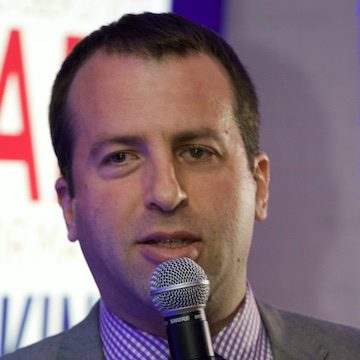Just before midnight last night, after most of Ari Goldkind’s supporters had left his post-election party, held at Andrew Richards Design in Corktown, he sat down on a couch near the entrance and placed his hands on his knees.
“I’m tired,” he said.
Three hours earlier, the criminal lawyer learned the final result of his eight-month campaign to become the next mayor of Toronto: he finished in fourth place — earning almost 4,000 votes — with John Tory coming out on top.
“It’s 11:30. The election’s been done for three hours,” he said. “But you always go through what could have been. What would it have been like if more people heard my voice?”
Still, it’s hard to deny the progress he’s made since starting his run for mayor eight months ago in total obscurity. “I get recognized all over,” he said. “I’m stopped in the car, stopped in the subway. It’s weird, but it’s gratifying because it’s not recognition for celebrity purposes . . . It’s not like people are recognizing me because I did a line of coke.”
In the last weeks of the campaign, he said voters approached him on the street to praise his ideas — especially his promise to raise property taxes and add tolls to the Gardiner Expressway and the Don Valley Parkway to fund a $57-billion transit plan. Others had seen him aggressively challenge Doug Ford in the mayoral debates.
Such stardom stands in stark contrast to the profile Goldkind had a few months ago, when, every time he met someone, he was meeting them for the first time.
His lead political advisor, Jodi Kovitz, a lawyer at Osler, Hoskin & Harcourt LLP, who worked with Goldkind for free during her spare time, said it took real courage to run for mayor as a complete unknown. Every weekend, Goldkind would canvass the city, attending events. And every day, Kovitz said, she told him, “This is hard, and you’re doing great. Keep doing it.”
“I believe in myself, but when you go up to people and they’ve never heard of you, sometimes they won’t give you the time of day,” Goldkind said, noting that those early days were “extremely” difficult. But the effort usually paid off. “By the end of the conversation, people would say, ‘Can I have your card? I’m going to look you up.’”
Aside from his grassroots success — he built a network of about 20 dedicated volunteers — Goldkind is baffled that he never garnered more media spotlight. From day one, he said, journalists branded him as a “fringe” candidate who could never win. And, no matter what he tried, he couldn’t shake that storyline.
“I never understood how my story wasn’t a more interesting story to people,” he said. “I think that anywhere else in North America, somebody would have said, ‘Here’s this young, exciting guy who’s telling the truth, who’s resonating with Torontonians. And he may pull a hell of a surprise.’ That’s a very different narrative.”
Had the media presented him as a potential spoiler, Goldkind thinks it could have changed the course of the election. And, had there not been so much pressure to vote for Tory — to keep Ford out of power — Goldkind said he would have received more votes.
In the end, Goldkind has to find a silver lining in the fact that he went from being someone “nobody knows” to “being, by and large, respected throughout the city.”
Meanwhile, his supporters are far less restrained in their enthusiasm. “There was no reason to believe that he would get this far when I first met him,” said Scott Peterson, a 43-year-old server who started volunteering for Goldkind in the summer. “The fact that he has gotten this far is incredible. He may not be the mayor now, but I certainly hope he sticks around and tries next time.”
For now, Goldkind won’t commit to anything of the sort in the future.
But one thing is clear: he is getting his legal practice back into full swing after essentially working full-time on his campaign over the past month. In fact, he’ll be at the courthouse today. He’s starting a murder trial.
Photo: Sean Robichaud


